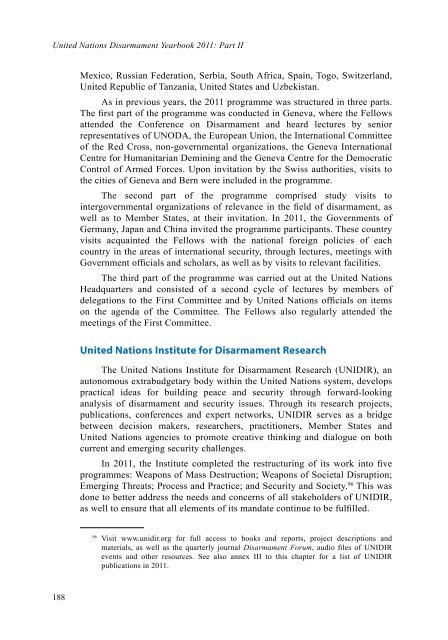DYB2011-Part-II-web
DYB2011-Part-II-web
DYB2011-Part-II-web
Create successful ePaper yourself
Turn your PDF publications into a flip-book with our unique Google optimized e-Paper software.
United Nations Disarmament Yearbook 2011: <strong>Part</strong> <strong>II</strong><br />
188<br />
Mexico, Russian Federation, Serbia, South Africa, Spain, Togo, Switzerland,<br />
United Republic of Tanzania, United States and Uzbekistan.<br />
As in previous years, the 2011 programme was structured in three parts.<br />
The first part of the programme was conducted in Geneva, where the Fellows<br />
attended the Conference on Disarmament and heard lectures by senior<br />
representatives of UNODA, the European Union, the International Committee<br />
of the Red Cross, non-governmental organizations, the Geneva International<br />
Centre for Humanitarian Demining and the Geneva Centre for the Democratic<br />
Control of Armed Forces. Upon invitation by the Swiss authorities, visits to<br />
the cities of Geneva and Bern were included in the programme.<br />
The second part of the programme comprised study visits to<br />
intergovernmental organizations of relevance in the field of disarmament, as<br />
well as to Member States, at their invitation. In 2011, the Governments of<br />
Germany, Japan and China invited the programme participants. These country<br />
visits acquainted the Fellows with the national foreign policies of each<br />
country in the areas of international security, through lectures, meetings with<br />
Government officials and scholars, as well as by visits to relevant facilities.<br />
The third part of the programme was carried out at the United Nations<br />
Headquarters and consisted of a second cycle of lectures by members of<br />
delegations to the First Committee and by United Nations officials on items<br />
on the agenda of the Committee. The Fellows also regularly attended the<br />
meetings of the First Committee.<br />
United Nations Institute for Disarmament Research<br />
The United Nations Institute for Disarmament Research (UNIDIR), an<br />
autonomous extrabudgetary body within the United Nations system, develops<br />
practical ideas for building peace and security through forward-looking<br />
analysis of disarmament and security issues. Through its research projects,<br />
publications, conferences and expert networks, UNIDIR serves as a bridge<br />
between decision makers, researchers, practitioners, Member States and<br />
United Nations agencies to promote creative thinking and dialogue on both<br />
current and emerging security challenges.<br />
In 2011, the Institute completed the restructuring of its work into five<br />
programmes: Weapons of Mass Destruction; Weapons of Societal Disruption;<br />
Emerging Threats; Process and Practice; and Security and Society. 96 This was<br />
done to better address the needs and concerns of all stakeholders of UNIDIR,<br />
as well to ensure that all elements of its mandate continue to be fulfilled.<br />
96 Visit www.unidir.org for full access to books and reports, project descriptions and<br />
materials, as well as the quarterly journal Disarmament Forum, audio files of UNIDIR<br />
events and other resources. See also annex <strong>II</strong>I to this chapter for a list of UNIDIR<br />
publications in 2011.


